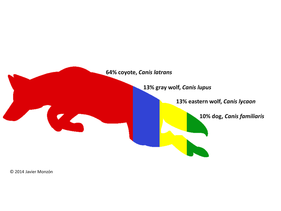 By Javier Monzon Is it considered cannibalism when a coyote eats a dog, but the coyote is actually a coyote-dog hybrid? Maybe the cannibalism question is akin to counting angels on pinheads, but it is true that coyotes - on occasion - eat pets (e.g. small dogs and outside cats) and that coyote-dog hybrids come aplenty. My recent research1 revealed that northeastern coyotes form what is called a “hybrid swarm,” a population of genetically admixed individuals that descended from an initial hybrid generation. All of 425 eastern coyotes that were analyzed across a vast region of the US and Canada had a genetic signal of past hybridization with dogs; the average eastern coyote is actually about 10% dog in its genetic makeup. It gets more complicated. It turns out that wolves are also involved in a canine ménage à trois, and not just one but two species of wolves. So besides being about 10% dog, the average northeastern coyote is also about 13% eastern wolf and 13% western gray wolf. That leaves only 64% of the genome of the northeastern coyote that can be traced to actual coyote ancestry. So what shall we call this chimeric canid? Some rural New Yorkers and New Englanders call it “Coydog.” Some scientists propose to call it “Coywolf.” I think “Coydolf” more appropriately reflect its complex hybrid origin, but still prefer the less creative moniker “Eastern Coyote.” Interestingly, the degree of genetic wolf-likeness is not distributed randomly or uniformly across the Northeast; coyotes inhabiting areas with more deer tend to be more wolf-like. This suggests that hybridization between coyotes and wolves introduced adaptive genetic variation that allowed coyotes to colonize eastern forests and exploit a landscape rich with deer prey. It also demonstrates that adaptation can occur very rapidly and at fine geographic scales. Perhaps, the remarkable adaptability of the Eastern Coyote will allow it to replace motorists as the apex predator that regulates suburban deer populations. Dr. Monzón is a postdoctoral fellow in the Department of Molecular Genetics and Microbiology at Stony Brook University. He recently completed his doctoral work on the population genomics of the eastern coyote and is currently conducting epidemiological studies on the lone star tick. 1 Monzón, J., Kays, R., Dykhuizen, D.E., 2014. Assessment of coyote-wolf-dog admixture using ancestry-informative diagnosticSNPs. Molecular Ecology vol 23: 182–197.
1 Comment
anks for sharing the article, and more importantly, your personal experience mindfully using our emotions as data about our inner state and knowing wdhen it’s better to de-escalate by taking a time out are great tools. Appreciate you reading and sharing your story since I can certainly relate and I think others can to
Reply
Leave a Reply. |
Archives
May 2024
|

 RSS Feed
RSS Feed